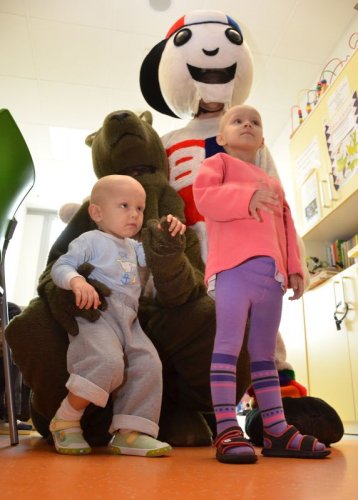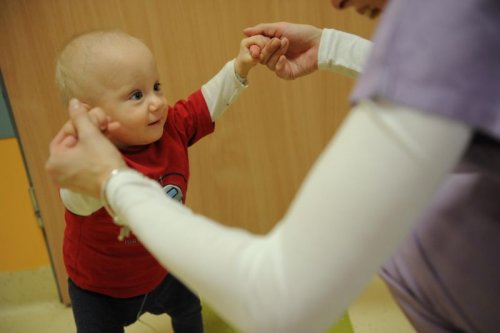And I still need to know ...
-
What to take to the hospital?
-
What will happen next?
-
How can I help my child?
-
Who will tell us more?
-
Why don't we say "cancer"?
 What to take to the hospital?
What to take to the hospital?
Especially in the first weeks, when your family gets used to the new situation, it is not easy to think about what to pack your child in the hospital.
To be hospitalized, be sure to take the following:
- medical reports about the child from other medical facilities
- health insurance card (and escort)
- OP for children from 15 years (also accompanied)
- contact details of the district pediatrician
- contact details of the employer (escort)
- contact details at primary and secondary schools
- comfortable clothes for about a week (pajamas, loose t-shirts, sweatpants)
- slippers (including accompaniment)
- patient's personal details (toys? featherbed? favorite CDs, DVDs? family photos?…)
- drugstore (towel, washcloth, toothbrush, shower gel, shampoo, comb,…)
- drugs
If you accompany your child throughout the hospitalization, do not forget to have enough of your own clothes, drugstore and your medication.
Detailed information on the course of hospitalization, the regime of visits and the stay of the accompanying parent can be found at hospital stay.
What will happen next?
After intensive care, follow-up care continues. This consists of regular visits to our outpatient clinic and outpatient clinics of other workplaces that took care of your child during intensive care. This is the so-called dispensary.
The aim of the dispensary is to detect and address possible long-term effects of chemotherapy and the late consequences of cancer treatment. The time schedule of dispensary checks at the outpatient clinic for long-term follow-up of patients after completed treatment and in adulthood depends on the basic diagnosis, treatment and depending on the risk of developing late sequelae.
Dispensary care is also necessary due to the possibility of recurrence of the disease (relapse, recurrence), the early detection of which increases the chance of cure.
- What exactly awaits your child and your family after treatment?
How can I help my child?
Childhood cancer requires very demanding and intensive treatment associated with a number of, often life-threatening, complications.
On our website, we will introduce you to a number of principles and rules, the observance of which is essential for the smoothest possible course of treatment. It will be your task to ensure that these regime measures are complied with and thus reduce the risk of complications in your child's health. Read what the upcoming is about therapy.
The main role of the family is to mentally support the child. We offer the patient and your whole family the opportunity to consult with our psychologists, who will help you maintain a good mental balance. Contact us psychosocial team.
The parent of a patient under the age of 10 can be admitted to the ward as an escort and stay in the room with him / her during the day operation of the clinic. In such a case, the parent can assist the nursing staff in the day-to-day care of the sick child. In serious cases, we also accept parents over the age of 10 to accompany the ward, always in consultation with the attending physician and the station nurse.
Who will tell us more?
The answers to any other questions and specific information about your child will be provided to you by his attending physician, resp. the head of the ward where the child is hospitalized. Ask your doctor.
Of course, you will be kept informed by all healthcare professionals who will be involved in the examination and treatment of your child.
Would it help you to talk to the families of our former patients? He contacts our families through Haima Association CZ.
Do you want to know the most detailed information about your child's diagnosis? It contains the diagnosis you are looking for classification of oncological diseases in childhood.
Why don't we say a word "cancer"?
Why don't you hear the word "cancer" in our workplace?
And why doesn't any of the experts in children with cancer use the word?
There are several reasons.
An unprofessional and misleading term
- The word "cancer" is a general term. Indicates the most common malignancies of adults (carcinomas), which are rare in children or do not occur at all.
- The meaning of the word "cancer" does not provide information on the patient's diagnosis. We do not know from the word "cancer" which organ needs to be treated or how the disease is spread throughout the body. The word "cancer" does not inform us about the patient's treatment or the chances of his cure.
- It is more appropriate to speak of a "cancer" or "cancer" of a particular organ.
- The word "cancer" is an unprofessional term. At our workplace, we approach sick children professionally and professionally. You will not hear the word "cancer" from our mouths.
Etymology of the word
- As prof. MUDr. Josef Koutecký, DrSc. in his book "The Inappropriate Word Cancer" (Makropulos, Prague, 1999), the word "cancer" is somewhat inaccurately called malignant tumors. The etymology of the word comes from the Greek "karkinos" and the Latin "cancer", both meaning "crab".
- Galen, Roman physician of the 2nd century. nl, reminiscent of the spread of breast cancer to the skin chest claw of a sea crab, cancer. In this sense, the word "cancer" is misleading and we should rather use the term "crab".
Carcinophobia
- Surely you know how the word "cancer" affects a person. When he utters it, we are immediately struck by words like "suffering," "despair," "death." The word "cancer" evokes many negative feelings in us, especially worries, fears and hopelessness. The disease fear of cancer is technically called carcinophobia. However, let's admit that most of us suffer from this phobia, at least in part.
- It is not our goal to arouse the feeling of hopelessness and despair in small patients and their families when they are first admitted to our clinic. We do not intend to scare anyone with suffering and dying.
- We currently successfully treat more than 80% of all pediatric patients, which is a reason to rejoice.
- Our aim is to inform families clearly, comprehensibly and professionally that the child has become seriously ill and that his diagnosis is malignant. Without treatment in the vast majority of cases fatal. The upcoming cancer treatment will be challenging, but there is a good chance of cure.
- And such communication does not require the use of unprofessional and misleading terms such as the word "cancer."


